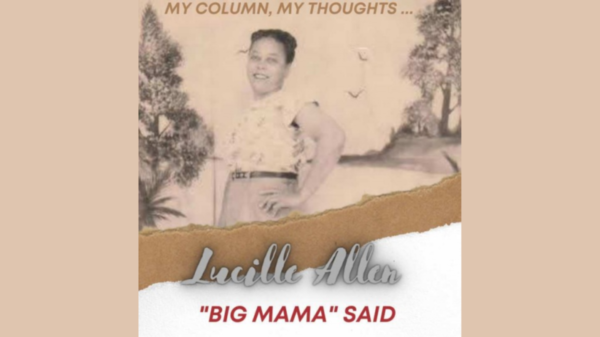By Terry Allen
In the tapestry of life, my grandmother, Lucille “Big Mama” Allen, was the thread that held our family together. She was a source of wisdom and faith, a guiding light to sons, daughters, grandchildren, great-grandchildren, great-great-grandchildren, great-great-great-grandchildren, nieces, and nephews. Big Mama was a living testament to the richness of African American Vernacular English (AAVE), a dialect of American English spoken by a significant proportion of African Americans. She constantly used nouns, terms and words like “chirren”, young-ins”, “peace-way”, “sassin” and more. Yet, we never missed the message and we never shamed anyone speaking in their cultural vernacular.
AAVE, like many other vernaculars, is a communal process, shaped by the experiences of its speakers. It is not limited to African Americans; various ethnic and regional groups across America have their own unique linguistic flavors that diverge from the standard “Good English.” Just as my dear friend, Rev Don Wink, knows when to say “Purt’near” instead of “almost there” in the white southern South, my northeast white ally, Robert, knows when to say “Let’s g’eat” and when to say “let’s go grab a bite.” Even my best friend, David, could distinguish between “Big Mama” and “Grandmother.”
Within our Black and BIPOC communities, we must be mindful of self-criticism. Our linguistic space is deeply layered with colorism, self-hatred, and other unique nuances stemming from our historical experiences. It’s crucial to recognize that there’s a distinction between speaking authentically and using slang derived from our age groups and experiences. We have to remove the negative words lik etrhe B-word and N-word from our spoken word.
Three examples of cultural vernacular and slang are:
- “Fam” – A term of endearment used within the community to refer to close friends or family members, signifying a sense of unity and support.
- “Bless up” – An expression of goodwill and positivity, often used as a form of greeting or encouragement.
- “Spillin’ the tea” – Refers to sharing gossip or engaging in candid conversation about personal matters, often with a touch of drama.
- “Skin in the Game”- That meant that you had experience and expertise on the subject matter
As we reflect on Big Mama’s legacy and the significance of language in our lives, I encourage others to share their examples of cultural vernacular and slang. Email me at the paper and at terryallenpr@gmail.com and share. Embracing our linguistic diversity can be a powerful way to celebrate our heritage and strengthen our sense of community. Y’all don’t hear me.
Terry Allen is an NABJ award- winning Journalist, DEI expert, PR professional and founder of the charity – Vice President at FocusPR, Founder of City Men Cook and Dallas Chapter President of NBPRS.org

You must be logged in to post a comment Login